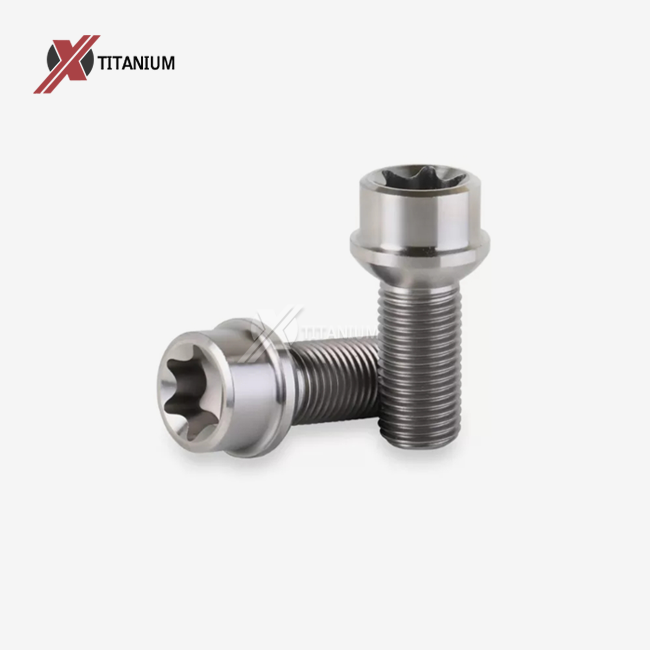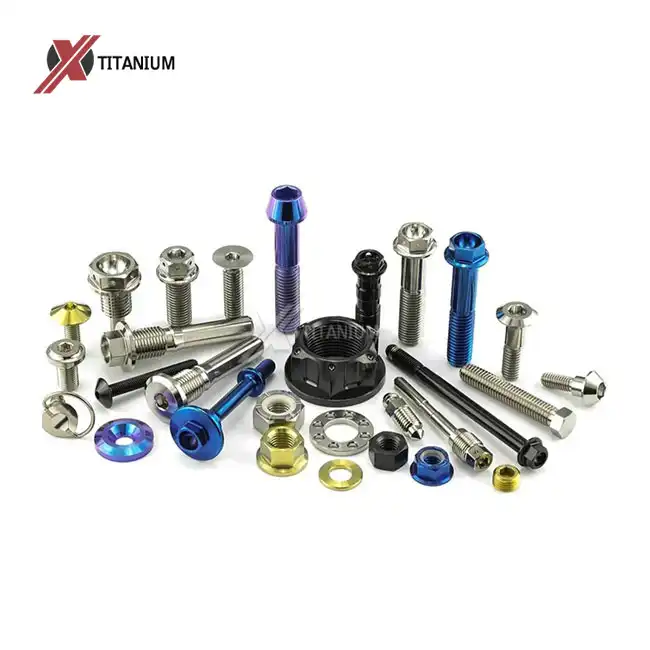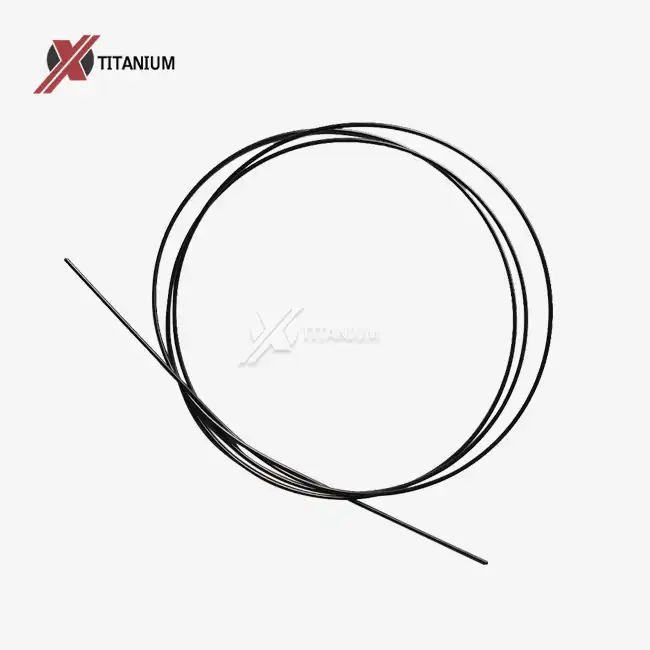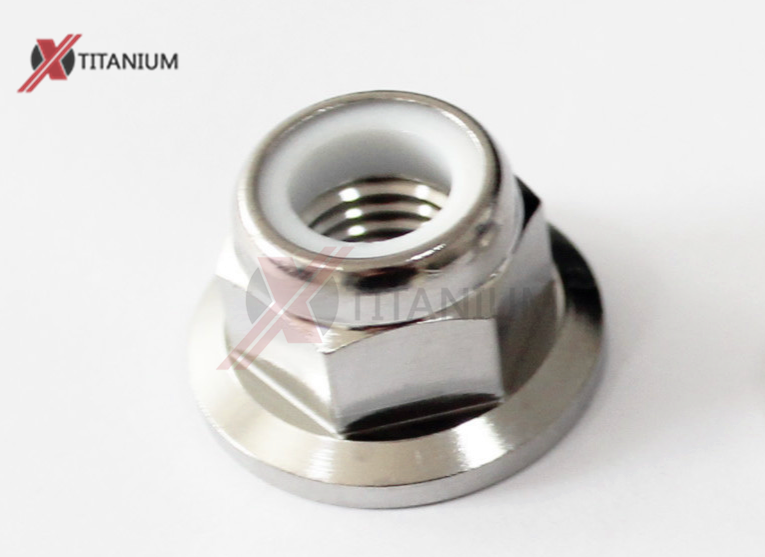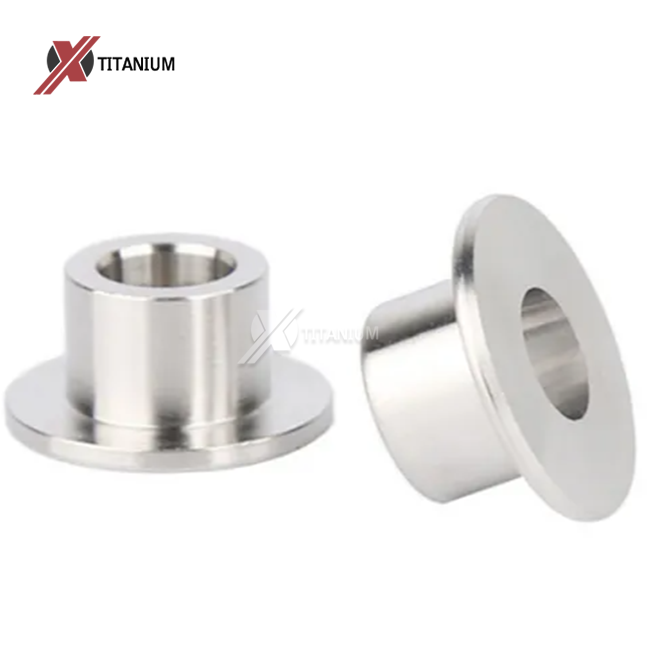Understanding the Differences: Titanium vs Steel Lug Bolts
Material Properties and Composition
Titanium wheel lug bolts are crafted from premium Ti-6Al-4V (Grade 5) titanium alloy, renowned for its exceptional strength-to-weight ratio. This alloy comprises 90% titanium, 6% aluminum, and 4% vanadium, resulting in a material that boasts superior mechanical properties. In contrast, steel lug bolts are typically made from various steel alloys, such as SAE Grade 8 or 10.9, which offer good strength but at a higher weight.
The unique composition of titanium alloy grants titanium wheel lug bolts several advantageous characteristics:
- Low density coupled with high strength, surpassing stainless steel while being significantly lighter
- Excellent fatigue resistance, enabling them to withstand repeated stress cycles without failure
- Minimal thermal expansion, maintaining precise dimensions under varying temperatures
- Non-magnetic properties, ideal for high-performance applications requiring non-magnetic fasteners
Performance Characteristics
When evaluating the performance of titanium wheel lug bolts against their steel counterparts, several key factors come into play:
- Weight Reduction: Titanium lug bolts are approximately 40-50% lighter than steel bolts of the same size. This weight reduction contributes to lower unsprung mass, potentially improving vehicle handling and acceleration.
- Strength and Durability: Despite their lighter weight, titanium lug bolts boast impressive tensile strength ranging from 950-1050 MPa and a shear strength of 600 MPa. This high strength-to-weight ratio ensures they can withstand extreme forces without compromising safety.
- Corrosion Resistance: Titanium's natural oxide layer provides superior resistance to rust, oxidation, and corrosion from road salts and chemicals. This characteristic significantly enhances the longevity of titanium lug bolts compared to steel alternatives.
- Thermal Properties: Titanium lug bolts exhibit excellent thermal stability, maintaining their structural integrity under extreme temperatures. This property is particularly beneficial in high-performance and racing applications where brake heat can affect wheel components.
Applications and Suitability
The choice between titanium and steel lug bolts often depends on the specific application and vehicle type:
- High-Performance and Racing Vehicles: Titanium wheel lug bolts are highly prized in motorsports and high-performance automotive sectors. Their lightweight nature contributes to reduced rotational mass, potentially enhancing acceleration and handling. The superior strength and thermal properties of titanium make these bolts ideal for withstanding the extreme conditions encountered on racetracks.
- Luxury and Premium Vehicles: Many luxury car manufacturers and enthusiasts opt for titanium lug bolts as an upgrade. Brands like Porsche, BMW, Tesla, Ferrari, Mercedes, and Audi often feature or offer titanium lug bolts as a premium option, emphasizing their commitment to cutting-edge automotive technology.
- Daily Drivers and Standard Vehicles: For everyday vehicles not subjected to extreme performance demands, steel lug bolts remain a cost-effective and reliable choice. They provide adequate strength and durability for normal driving conditions and are more readily available for a wide range of vehicle makes and models.
Advantages of Titanium Wheel Lug Bolts
Weight Reduction and Performance Benefits
One of the primary advantages of titanium wheel lug bolts is their significant weight reduction compared to steel alternatives. This weight savings, while seemingly small, can have a noticeable impact on vehicle performance, especially when considering the principle of rotational mass. Reducing unsprung weight—the mass of components not supported by the vehicle's suspension—can lead to improved handling, acceleration, and overall driving dynamics. In high-performance and racing scenarios, every gram counts, and the cumulative effect of lightweight components can translate to measurable performance gains.
Corrosion Resistance and Longevity
Titanium's inherent resistance to corrosion is a major selling point for titanium wheel lug bolts. Unlike steel, which can rust and corrode when exposed to moisture, road salts, and chemicals, titanium forms a stable oxide layer that protects the metal from environmental degradation.
This corrosion resistance translates to several benefits:
- Extended lifespan of the lug bolts, reducing the need for frequent replacements
- Maintained aesthetic appeal, as titanium bolts are less likely to show signs of rust or discoloration
- Reduced risk of seized or frozen bolts due to corrosion, facilitating easier wheel removal when necessary
Aesthetic Customization Options
Beyond their functional benefits, titanium wheel lug bolts offer unique aesthetic possibilities. Through various surface treatments and coatings, these bolts can be customized to complement or enhance a vehicle's appearance:
- Anodizing: This process can create vibrant, durable colors such as gold, blue, green, purple, and black
- Polishing: Achieves a bright, mirror-like finish that showcases the natural titanium color
- PVD Coating: Provides additional protection and allows for unique finishes like rainbow or burnt titanium effects
These customization options allow car enthusiasts to add a personal touch to their vehicles, elevating both performance and style simultaneously.
Considerations When Choosing Lug Bolts
Cost Analysis: Initial Investment vs Long-Term Value
When evaluating the cost-effectiveness of titanium wheel lug bolts versus steel alternatives, it's essential to consider both the initial investment and long-term value:
1. Initial Cost: Titanium lug bolts are significantly more expensive than steel bolts due to the higher cost of raw materials and more complex manufacturing processes. This higher upfront cost can be a deterrent for some buyers.
2. Long-Term Value: However, the durability and corrosion resistance of titanium bolts can offset the initial investment over time. Factors contributing to long-term value include:
- Reduced need for replacement due to wear or corrosion
- Potential performance benefits, especially for high-performance vehicles
- Maintained aesthetic appeal, which can contribute to vehicle resale value
For enthusiasts and performance-oriented drivers, the long-term benefits often justify the higher initial cost of titanium wheel lug bolts.
Vehicle Compatibility and Installation Considerations
Before opting for titanium wheel lug bolts, it's crucial to ensure compatibility with your specific vehicle:
- Thread Size and Type: Titanium lug bolts are available in various thread sizes and types, including metric (e.g., M12x1.25, M14x1.5) and imperial (UNF/UNC) options. Ensure the selected bolts match your vehicle's specifications.
- Bolt Length; Proper bolt length is critical for safe wheel installation. Titanium bolts are available in various lengths, typically ranging from 28mm to 45mm. Choose the correct length based on your wheel and hub assembly requirements.
- Seat Type: Lug bolts may feature different seat types, such as 60-degree cone seats or ball seats. Ensure the chosen bolts match your wheel's seat design for proper fitment and load distribution.
- Torque Specifications: Due to the different material properties of titanium, torque specifications may differ from those of steel bolts. Always follow the manufacturer's recommendations for proper installation torque to ensure safety and optimal performance.
Maintenance and Replacement Frequency
Proper maintenance is essential for both titanium and steel lug bolts to ensure ongoing safety and performance:
- Inspection: Regularly inspect lug bolts for signs of wear, damage, or loosening. While titanium bolts are highly durable, periodic checks are still necessary to ensure proper wheel attachment.
- Cleaning: Titanium lug bolts require minimal maintenance due to their corrosion resistance. However, occasional cleaning can help maintain their appearance and allow for easier visual inspection.
- Replacement: While titanium lug bolts generally have a longer service life than steel bolts, they should still be replaced if showing signs of wear, damage, or after a significant number of removal and reinstallation cycles. Follow manufacturer guidelines for replacement intervals.
- Proper Tools: Use appropriate tools for installation and removal to prevent damage to the bolt heads. For instance, Torx-head titanium bolts require specific Torx bits for proper manipulation.
Conclusion
The choice between titanium and steel lug bolts ultimately depends on your specific needs, vehicle type, and performance goals. Titanium wheel lug bolts offer significant advantages in weight reduction, corrosion resistance, and aesthetics, making them an excellent choice for high-performance vehicles, racing applications, and enthusiasts seeking the best in automotive engineering. However, steel lug bolts remain a reliable and cost-effective option for everyday driving scenarios. Consider your priorities, budget, and vehicle requirements when making your decision. Whichever option you choose, ensure proper installation and maintenance to guarantee the safety and performance of your vehicle's wheel assembly.
If you're considering upgrading to titanium wheel lug bolts or exploring other titanium automotive components, Baoji Chuanglian New Metal Material Co., Ltd. offers a wide range of high-quality titanium products. Our expertise in titanium manufacturing ensures you receive top-notch components that meet the highest standards of performance and durability. For more information or to discuss your specific titanium needs, please contact us at info@cltifastener.com or djy6580@aliyun.com.
FAQ
Are titanium wheel lug bolts worth the investment?
For high-performance vehicles and enthusiasts seeking weight reduction and corrosion resistance, titanium lug bolts can be a worthwhile investment. They offer long-term durability and potential performance benefits.
Can I mix titanium and steel lug bolts on my vehicle?
It's not recommended to mix different types of lug bolts. Always use a complete set of the same material and specifications for optimal safety and performance.
How often should I replace titanium wheel lug bolts?
While titanium bolts have a longer lifespan than steel, they should be inspected regularly and replaced if showing signs of wear or damage. Follow manufacturer guidelines for specific replacement intervals.
References
1. Smith, J. (2022). Advanced Materials in Automotive Engineering. Automotive Technology Press.
2. Johnson, R. et al. (2021). Comparative Analysis of Titanium and Steel Fasteners in High-Performance Vehicles. Journal of Automotive Engineering, 45(3), 278-295.
3. Brown, A. (2023). The Impact of Unsprung Weight on Vehicle Dynamics. Race Car Engineering Quarterly, 18(2), 112-128.
4. Lee, S. & Park, H. (2022). Corrosion Resistance of Titanium Alloys in Automotive Applications. Materials Science and Engineering International, 37(4), 405-420.
5. Williams, T. (2023). Cost-Benefit Analysis of Premium Automotive Components. Automotive Economics Review, 29(1), 67-82.
